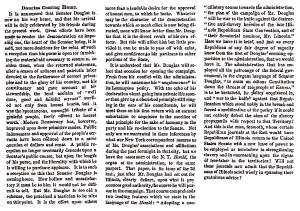Record Data
Transcription
Douglas Coming Home.
It is announced that Senator Douglas is now on his way home, and that his arrival will be duly celebrated by his friends during the present week. Great efforts have been made to render the demonstration an imposing one, the heart of the Senator being, it is said, not more desirous for the [illegible] of such reception than his purse is open for furnishing the material aid necessary to secure it. [illegible] olden times, when the returned statesman, after a [season?] of arduous and patriotic labor devoted to the furtherance of correct principles and to the glory of his country, met his constituency and gave account of his stewardship, the loud acclaim of “well done, good and faithful servant” swelled not only from honest hearts, but it was the spontaneous, unsought tribute of a grateful people, freely offered to honest worth. Modern Democracy has, however, improved upon these primitive modes. Public endorsement and approval of the people’s servants have been reduced down to a mere question of dollars and cents. A public reception no longer necessarily depends upon a Senator’s public course, but upon the length of his purse, and the liberality with which he is willing to purchase applause. It is to such a reception as this that Senator Douglas is coming home. How hollow and unsatisfactory it must be to him it would not be difficult to tell. But Mr. Douglas is too old a schemer, too practiced a tactician to be nice on this point. It is the effect upon others more than a laudable desire for the approval of honest men, to which he looks. Whatever may be the character of the demonstration towards which so much effort is now being directed, none will know better than Mr. Douglas that it is the direct result of his own efforts. But this will affect him but little provided it can be made to pass off with éclat, and give confidence to his partisans in other portions of the State.
It is understood that Mr. Douglas will select that occasion for opening the campaign. Fresh from his conflict with the administration, he will announce his “acquiescence” in its Lecompton policy. With the echo of his declaration about going into private life sooner than give up a cherished principle still ringing in the ears of his constituents, he will meet them on his first return with an earnest exhortation to acquiesce in the sacrifice of that principle for the sake of harmony in the party and his re-election to the Senate. Not only are we warranted in these inferences by what our New York correspondent assures us of Mr. Douglas’ associations and affiliations during the past fortnight in that city, but we have the assurance of the N. Y. Herald, the organ of the administration, to the same purport. That paper, in its issue of the 3d inst., just after Mr. Douglas had set out for Illinois, clearly defines, upon what it pronounces good authority, the course he will pursue in the campaign. That course comprehends two leading features which we state in the language of the Herald: “Adopting a conciliatory course towards the administration, the plan of the campaign of Mr. Douglas will be war to the knife against the destructive anti-slavery heresies of the late Illinois Republican State Convention, and of their Senatorial nominee, Mr. Lincoln.” Here we have it in brief, and just as every Republican of any fair degree of sagacity knew from the first of Douglas’ seeming opposition to the administration, that we would have it. The administration that has employed all the patronage of the federal government, in the elegant language of Senator Douglas,” to cram an odious Constitution down the throats of the people of Kansas,” is to be sustained, its policy acquiesced in, and “war to the knife” against that Republicanism which stood nobly in the breach and forced a modification of the policy if it could not entirely defeat the aims of the slavery propaganda with respect to that Territory! And this is the man, forsooth, whom certain Republicans journals at the East would have Republicans of Illinois return to the United States Senate with a new lease of power to be employed as heretofore in strengthening slavery and in encroaching upon the rights of free-labor in the territories! Will not these journals now admit that the Republicans of Illinois acted wisely in spurning their gratuitous advice?




